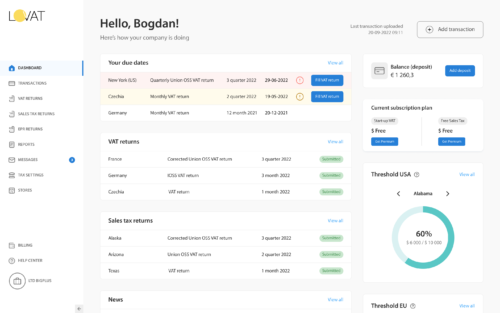Lovat Newsletter – April 2023
The most interesting this month: Transition to a new version of the user account, 9 requirements for non-EU companies to obtain an EU VAT number, and Israel’s transition to a new tax regime.
Lovat’s new user account

We are thrilled to announce that we are upgrading our platform to a new version of the user account, starting on April 24. This new update is designed to make managing tax responsibilities even easier and more efficient.
Origin-based vs. destination-based sales tax rates
Understanding the difference between these two systems is crucial for business operations, especially with the implementation of Internet sales tax laws. In this article, we explore the impact of sales tax rates on businesses and consumers and provide insights into how to navigate these systems.
9 requirements for non-EU companies for obtaining a VAT number in the EU
For companies expanding their business into the European Union, it is important to obtain a VAT number. In this article, we cover the 9 requirements for non-EU companies to obtain a VAT number in the EU, including selling goods, storing goods, and providing services to EU customers. Registering for a VAT number can help businesses comply with EU VAT regulations, access new customers, appear more credible, and reclaim VAT paid on goods and services purchased within the EU.
Check out Lovat’s online VAT registration service for a simplified and efficient process
News digest
Israel proposes new VAT tax regime for Online services and e-commerce sales.
On February 15, 2023, Israel introduced a new proposal to transition to a new tax regime that requires registration, collection, and remittance of VAT. This applies to electronic services, communication services, tangible low-value goods, and online stores. The obligation to charge and collect VAT only applies to sales made to consumers (B2C sales) who are Israeli residents that are not taxpayers, financial institutions, or not-for-profit associations. The location of a customer is determined by their place of residence, means of payment, and equipment or stationary infrastructure. The proposal does not include a registration threshold, and it’s still unclear if a marketplace will be obligated to charge and collect VAT for sales facilitated on behalf of vendors on their platforms.
Follow us on social networks to be the first to know the latest news: Facebook, LinkedIn
